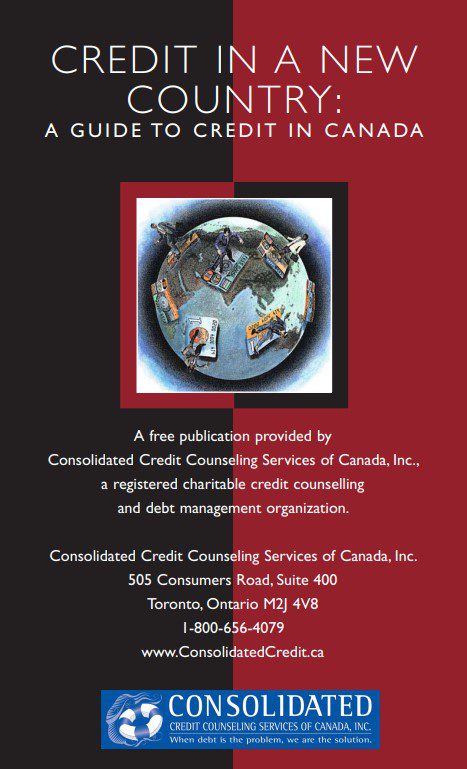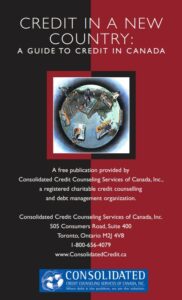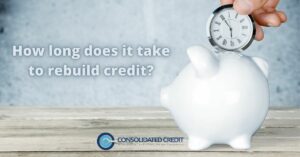
Credit in a New Country
Establishing good credit is often frustrating for those who are new to this country and don’t understand how the system works. Establishing credit is a critical component for financial survival. Use this booklet to guide you through the basics of developing credit in this country.

Congratulations on taking this important step to a brighter financial future. Consolidated Credit Canada has been helping Canadians across the country solve their credit and debt problems for years.
Our Educational Team has created over twenty-five publications to help you improve your personal finances. By logging onto www.consolidatedcreditcanada.ca you can access all of our publications free of charge. We have tools to help you become debt free, use your money wisely, plan for the future, and build wealth. The topics Consolidated Credit Canada addresses range from identity theft to building a better credit rating; from how to buy a home to paying for university. On our website, you will also find interactive tools that allow you to calculate your debt and see how much it is costing you.
We are dedicated to personal financial literacy and providing a debt-free life for Canadians. If you are overburdened by high interest rate credit card debt, then I invite you to speak with one of our trained counsellors free of charge by calling (844)-402-3073 for free professional advice.
Sincerely,
Jeffrey Schwartz
Executive Director
Consolidated Credit Canada.
Credit In A New Country
Establishing good credit is often frustrating for those who are new to this country and don’t understand how the system works. Establishing credit is a critical component for financial survival. For instance, if you do not have a credit history you will not be able to have your electric/hydro or telephone turned on in your home in many provinces unless you pay a hefty deposit. If you are not careful, you may fall for credit scams that can cost consumers a lot of money. This publication is designed to help you understand how credit works, how to get credit and avoid expensive traps.
An Overview
Credit allows you to:
• Buy now and pay for the item later
• Make large purchases and pay for them over time
• Build a good credit rating if you pay your bills on time
There are two main types of credit:
Instalment loans let you borrow a fixed amount and pay it back in fixed monthly payments. A good example is a car loan, where you will borrow enough to buy the car and then pay it back over two to seven years.
Revolving accounts or “lines of credit” give you a certain amount you can borrow against (your “credit limit”). You can usually then pay the balance off in full or make smaller minimum payments. A good example of a revolving account is a credit card.
Warning! The minimum required payment on most credit cards is so small that even a balance of $500 – $1000 can take years to pay off if you only make the minimum payment each month.
Types of accounts typically included in a credit report include:
• Credit cards
• Department store cards
• Gas company cards
• Bank loans
• Auto loans and auto leases
• Recreational vehicle loans
• Mortgages
• Consumer finance company accounts
• Credit union credit cards or loans
Types of accounts that traditionally do not appear on a standard credit report:
• Rent payments
• Rent-to-own accounts
• Payday loans or loans from cheque cashing outlets
• Chequing account information
• Interac cards
Some creditors will only report your account if you are late on your payments, but not if you pay on time. Cellular phone companies are a good example of this. They generally only report accounts that have not been paid and have been turned over to collection agencies. Since companies are not required to report information to credit reporting agencies, not all do. Some will report to one of the major credit reporting agencies, but not both of them.
When you are establishing credit, your goal should be to get accounts that will be reported each month to both of the major credit bureaus. Be sure to pay each bill on time or you may risk a late payment on your credit report. Late payments stay on your report for six to ten years and make it more difficult to get credit at good rates and terms.
Some loans are secured which means you pledge collateral the lender can “repossess,” or take back if you don’t pay the loan as agreed. Most car loans and home loans are secured loans.
Other loans, especially credit cards, are unsecured, which means there is no collateral for the loan. Unsecured loans can be harder to get because there is nothing to back up the loan, other than your promise to pay.
Getting Approved
One of the reasons credit is so widely available in Canada is because we have a strong credit reporting system. Credit reporting agencies (also known as “credit bureaus”) are companies that collect information about how consumers pay their bills and sell that information as credit reports to businesses that may use them for credit and insurance purposes.
Credit reports contain four basic categories of information, including personal information (name, current and previous addresses, Social Insurance Number), account information (credit accounts you’ve held, the most you’ve borrowed, the current balance and whether you’ve paid on time), public record information (bankruptcy, court judgments or tax liens) and inquiries (the names of companies that have looked at your credit rating in the past three years).
Human Rights Act
The Canadian Human Rights Act was originally drafted in 1976 and is regularly updated and revised. This act regulates how creditors lend money to customers. It prohibits any form of discrimination from being employed when making credit decisions. This is not just limited to approving an application for credit, but also includes credit line increases, decreases, interest rate changes and any other judgmental decision made on your account.
It’s In The Numbers
When you go into many retail stores in Canada, you may be offered an opportunity to apply for a credit card “instantly.” How is it that companies can offer credit on the spot? It’s because they use credit scores that predict how likely someone is to pay their bills in the future.
Most credit scores are created by a company called Fair Isaac, which creates what are called “FICO” credit scores. To create a credit score, information in credit reports, account histories or credit applications are evaluated to find out what consumers who pay their bills on time have in common and then they are assigned a number, and that is their credit score.
According to Fair Isaac, the factors that make up your credit score fall into five main categories:
Payment History – 35%
Amounts You Owe – 30%
Length of Credit History -15%
New Credit -10%
Type of Credit In Use – 10%
The most important factors in a score are your payment history and the amounts you owe. If you have few or no credit accounts that have been reported to the credit reporting agencies then you may have no credit score, or your score may be low due to little credit experience.
Credit scores usually fall between 350 and 850. A score below 650 is usually considered quite low (risky) and therefore it will be difficult to get credit at the most favourable terms. A score of 650 – 680 is still risky but credit is generally available at less favourable terms. A score of 680 – 720 is better, while a score of 720 and above is usually considered very good. Keep in mind that every creditor has its own policies, and each one may look at the same score differently.
Also, keep in mind that your credit score can be different, depending on which of the major credit bureaus supplied the information used to create it, what kind of loan is being considered, and what formula each lender uses.
Note: Even though Equifax and TransUnion operate in countries other than Canada, the foreign credit reporting agencies do not necessarily share files with Canada.
Getting Started
Many Canadians don’t have credit histories because they haven’t established credit with traditional lenders. These consumers may rent their homes or apartments, use cheque cashing outlets for payday loans, or buy their furniture and appliances from rent-to-own stores. There are efforts underway to give these consumers some “credit” for paying those kinds of bills on time.
Getting Your First Credit
To get your first credit card, you may need the following:
• Valid Social Insurance Number
• Proof of your address, such as a copy of a utility bill in your name
• Proof of income such as a copy of recent pay stubs or tax return
• A chequing and/or savings account in your name. Every creditor has different requirements, so be sure to ask about the lender’s minimum requirements before you apply.
Students
If you are a university or college student, you may want to apply for a student credit card. These cards typically do not require an established credit history or strong income. Applications are often mailed to students or available on campus.
Social Insurance Numbers
Generally, to get a major credit card or other loans, you will need a valid Social Insurance Number first. For information on obtaining a Social Insurance Number go to www.servicecanada.gc.ca. You can also visit a local Service Canada office. You can usually get a Social Insurance number as long as you are eligible to work in Canada.
Secured Credit Cards
One of the fastest ways to get a credit card and establish a credit history can be a secured credit card. With a secured card, you place a deposit with the issuing institution. You will get a MasterCard or Visa card with a credit line that is usually equal to your deposit. You can use the card anywhere that MasterCard or Visa cards are accepted. Ideally, you should choose a secured card that reports your monthly payment history to all major credit-reporting
agencies. Visit www.fcac-acfc.gc.ca in the Consumer Section on Credit, Loans, and Debt.
Mortgages
It is possible to get a mortgage even if you don’t have an established credit history. To learn how to buy a home for the first time, review our publication Buying a Home, available free at www.ConsolidatedCredit.ca in the Learning Centre.
Traps and Scams to Avoid
Advance Fee Loan Scams: Scam artists are preying on vulnerable consumers by making big promises with no follow-through. You have probably seen it on television, on the radio or even in your mailbox. They will offer the promise that you are guaranteed approval for a loan or credit account regardless of your credit history. It typically sounds too good to be true, because it is. Thieves will promise you money regardless of your credit history with one requirement. A fee. After they obtain your money, you will end up with nothing. You should not have to pay a fee in advance to get a loan.
Some legitimate companies do charge fees in addition to interest for you to borrow their money. The difference is that a legitimate company will factor the fee into the loan amount or bill you an additional amount on one of your statements. For example, if you have a credit card that offers a travel points program, they may charge an annual fee that will be billed on one of your statements. If a company offers to give you a credit card with a travel program after you send them $100, a red flag should go up. Total credit card fraud losses reported in 2010 exceeded $365M according to RCMP.ca
Guaranteed Unsecured Credit Cards: Be very suspicious of cards that guarantee that you will be approved. These come-ons usually fall into one of two categories.
1. Cards that may sound like major credit cards, but can only be used to buy merchandise from the companies’ catalogue. These cards are usually not very helpful in establishing credit. In addition, the merchandise may require large down payments, and be overpriced.2. Cards that are major credit cards but carry very high fees. You may get a starting credit line of $300, for example, but the fees on the first bill may total $250 or more, leaving you with very little available credit. Unlike a secured card, where your deposit will be returned if you pay your bills, you will never get those fees back.
2. Cards that are major credit cards but carry very high fees. You may get a starting credit line of $300, for example, but the fees on the first bill may total $250 or more, leaving you with very little available credit. Unlike a secured card, where your deposit will be returned if you pay your bills, you will never get those fees back.
Payday Loans: Cheque cashing outlets will allow you to borrow against your next paycheque, for a fee. The fees on these short-term loans are so high, however, that the effective interest rate can be over 700%!
In addition, if you cannot pay back the loan in full with the next paycheque it will be rolled over to the next, and you may end up in a vicious cycle where you are unable to ever pay off the loan. The government of Canada provides an educational booklet on the cost of payday loans. You can view this booklet in its entirety at http://www.fcac.gc.ca in the Consumer Section under Credit, Loans, and Debt.
Tips for Smart Credit Card Use
* Don’t pay interest on items you don’t really need, or for things that will be gone by the time you get your bill. Otherwise, it’s the opposite of getting a bargain – it is like buying that item marked up instead of marked down!
* Read your credit card agreements and the correspondence you get from issuers. Creditors can generally change your interest rate with only 30 days written notice – even on a card with a fixed rate if you have missed payments.
* Always mail your payments for your credit cards at least 5 business days before the due date. Most credit card companies reserve the right to increase your interest rate on new purchases as well as any current balance to a very high rate if you are late.
* If you pay your debts late, a late payment can report for six to ten years. Your other credit card issuers may raise your interest rates if they see you are falling behind on other accounts.
* Call the credit card company if you can’t make a monthly payment on time. Ask them about alternative payment arrangements that won’t damage your credit or raise your interest rate. A credit counselling agency like Consolidated Credit Counseling Services of Canada, Inc. can help you work out a payment plan with your creditors if you are having trouble keeping up. They can be reached at 1-800-656-4079.
* Notify your credit card issuer 30 days before you move, and don’t assume that just because you didn’t get a bill you don’t have to pay it. If a bill doesn’t arrive, call your card issuer or lender immediately.
* Try to pay off your total balance each month. Just paying the minimum is a trap. If you pay just the minimum of a $1,000 debt on a card with an 18% interest rate, it will take you more than 12 years to repay.
* Aim to keep your debt payments at less than 10% of your income after taxes. If you take home $750 a month, for example, spend no more than $75 a month on credit.
Resources
The best way to get accurate and thorough information is to go right to the source. For information regarding how to read your credit bureau, how to obtain your credit bureau and how to dispute information see the information below:
Equifax Canada
Mail requests to:
Equifax Canada Co.
Consumer Relations Dept
Box 190 Jean Talon Station
Montreal, Quebec
H1S 2Z2
Phone: 1-800-465-7166
www.equifax.ca
TransUnion Canada
Mail requests to:
TransUnion Consumer
Relations Dept.
P.O. Box 338, LCD1
Hamilton, ON
L8L 7W2
www.transunion.ca
Phone: 1-800-663-9980
About Consolidated Credit Canada
Consolidated Credit Counseling Services of Canada is a consumer-oriented, non-profit organization. We are an industry leader in providing credit counselling and debt management services. Our mission is to assist individuals and families in ending financial crises and to help them solve money management problems through education, motivation, and professional counselling. Our organization is funded primarily through voluntary contributions from participating creditors. Our programs are designed to save our clients money and liquidate debts at an excellent rate.
We are dedicated to empowering consumers through educational programs that will influence them to refrain from overspending and abusing credit cards, as well as to encourage them to save and invest. Regardless of whether your financial problems are due to the purchase of a new home, the birth of a child, major illness, or any other circumstance, we can help.
* If you are headed for a debt disaster visit www.ConsolidatedCreditCanada.ca or call (844)-402-3073 for free professional advice by a trained counsellor.



